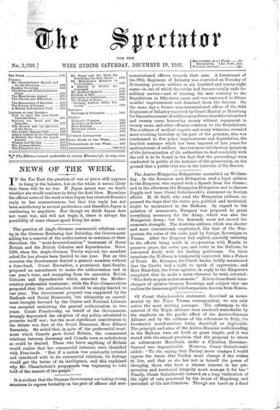The question of Anglo-German commercial relations came upin..the German Reichstag
last Saturday, the Government asking for a renewal of the authorisation to continue at their discretion the " most-favoured-nation" treatment of Great Britain and the British Colonies, and dependencies.. Since 1498, when the Anglo-German Treaty expired, the mandate asked for has always been limited to one year. But on this occasion the Government desired a general mandate without a time-limit. Count Reventlow, a prominent Anti-Semite, Pop"osed an amendment to make the authorisation end in one year's time, and exempting from its operation British Colonies and dependencies which accorded the Mother- country preferential treatment; while the Free Conservatives proposed that the authorisation should be simply limited to one year. The Government proposal was supported by the Radicals and Social Democrats, but ultimately an amend- ment brought forward by the Centre and National Liberals was accepted restricting the general authorisation to two years. Count Posadowsky, on behalf of the Government, strongly deprecated the adoption of any policy calculated to promote tariff war; but the most significant contribution to the debate was that of the Social Democrat, Herr. Eduard Bernstein. He noted that, in spite of the preferential treat- ment which Canada 'gave Great Britain, the commercial relations between Germany and Canada were as satisfactory as could be desired. Those who knew anything of Britain would realise that her commercial interests were identified with .Free-trade. "But if a nation was constantly. irritated and interfered with in its commercial relation's, its feelings would get the better of its intelligence, and this . explained why Mr. Chamberlain's propaganda was beginning to take hold of the masses- of the people." _ _ _ .


















































